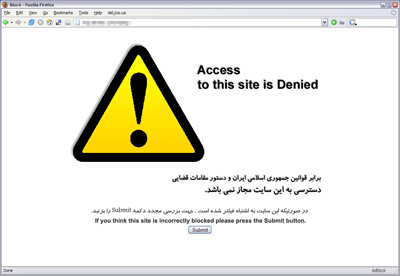Iran has a vital online community of around 60,000 active blogs and up to 20 million people connected to the internet [1]. As the Iranian cyber world is dynamic, so is government filtering of what content is accessible to Iranian citizens.
Beyond pornography websites, Iranian authorities target many political and social blogs and websites, depriving many from receiving information and expressing their ideas. The Iranian government does not have well-defined red lines, and it changes its filtering policies often, “giving” or “taking” virtual lives at will.

Iranian internet users are met with this image if they attempt to access content that is filtered
In this post we will discuss several issues related to filtering and try to clarify some common misunderstandings.
- Astronomic numbers:
Iranian officials in 2006 reported that 10 million websites and blogs had been filtered [2]and 90 percent of them contained “immoral” content. A few months ago, another report said 5 million websites and blogs had been blocked. A judiciary official also said [3] at the end of last year, that an additional $5 million (US) will be invested in a new ‘filtering system’. Faced with these astonishing numbers, Bruce Etling from the Berkman Center's ‘Internet and Democracy Project’ blog at Harvard School of Law was not entirely pessimistic writing [4]that the Iranian government claims are overblown, and that their own study [5]shows that only a fraction of the Iranian blogosphere is blocked.
- Top filtering priorities:
- Persian news websites such as BBC Persian, AmirKabir [6], a student news publication, and Balatarin [7], a popular citizen media portal.
- Women's rights activists, student movements, anti-government, political, anti-filtering and human rights blogs: We4change [8], a women's activist blog/website, has been filtered more than 20 times. In reality, no website or blog is immune to filtering.
- Social networking: Flickr [9] and Orkut [10] are currently blocked, BUT in last two months Iranians have been able to access Facebook and YouTube, although they were also blocked before. Iranians also have access to MySpace and Twitter.
The Iranian state's change of policy regarding Facebook and YouTube again shows the changing nature of its filtering policy. The reasons for this change of policy have not been announced and people are left to speculate. Some think the government became ‘more gentle and open’ because the presidential elections will are coming up in the summer. Others are more pessimistic and think security forces want to watch people's of the social networking websites to learn ‘who is who’ on the internet.
- What about English news sites?:
Iranians have access to most international news media such as the New York Times or Israeli news websites. It may be surprising for some to learn that anti-Bush and anti-Iraq war publications such as the Huffington Post [11] or Informed Comment [12] where many demands for the US government to engage with Iran have been filtered from the public for a long time.
- Are Islamist websites filtered too?
The answer is yes. Fatemeh Rajabi, is the wife of the Iranian government's spokesman and a strong supporter of president Mahmoud Ahmadinejad. Still, her site/blog was filtered [13]. She used to insult many other high-ranking Iranian politicians. Websites that favour the former president, Mohammad Khatami, such as Yari News, get filtered [14]too.
- Who does the filtering?
An official filtering committee is composed of members of the Ministry of Culture and Islamic Guidance, the Intelligence Ministry, National TV and Radio. Their orders are executed by the Iranian Ministry of Telecommunication. It is rumoured that police forces, wish to send a member to this committee too.
- Testimonies and stories:
- A first-hand testimony, interview [15] with Jomhour an Iranian blogger.
- A few Global Voices roundups about Iranian challenges, from collective filtering [16] to the feelings of a filtered blogger [17].
- I know many bloggers share [18]Freekeybord's opinion that filtering is really stupid. He claims his blog was filtered two months ago, but he now gets more visitors than before..